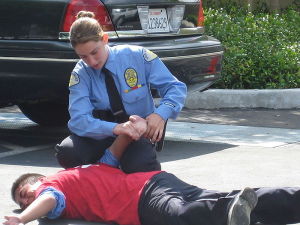J. Bradley Smith of Arnold & Smith, PLLC answers the question “Should I talk to the police?”
A recent United States Supreme Court has some legal observers complaining that police officers are entitled to mistakes of law, while ordinary citizens are not. The decision underlines, however, the ignorance many citizens have about their own rights under the Fourth Amendment to the Constitution of the United States.
 As Maynor Javier Vasquez drove a Ford Escort north a little before eight o’clock in the morning on April 29, 2009, on Interstate 77 in Dobson, North Carolina, Sergeant Matt Darisse of the Surry County Sheriff’s Department—who was observing northbound traffic—thought the Vasquez looked “stiff and nervous.”
As Maynor Javier Vasquez drove a Ford Escort north a little before eight o’clock in the morning on April 29, 2009, on Interstate 77 in Dobson, North Carolina, Sergeant Matt Darisse of the Surry County Sheriff’s Department—who was observing northbound traffic—thought the Vasquez looked “stiff and nervous.”
Sgt. Darisse pulled out and followed Vasquez, ultimately signaling for him to pull the car over. After he pulled Vasquez over, Sgt. Darisse explained that as long as Vasquez’s license and registration checked out, he would be let off with a warning ticket. Sgt. Darisse had pulled Vasquez over, the officer explained, because one of the brake lights on the Ford Escort was out.
That one shuddered brake light became a pesky issue on the years of appeals that arose out of the encounter that began between Sgt. Darisse and Vasquez. In the end, the North Carolina state appellate courts agreed that the brake-light statute, using the language “a” stop lamp, only requires one working brake light on a motor vehicle.
 Charlotte Criminal Lawyer Blog
Charlotte Criminal Lawyer Blog





 The case, Peugh v. United States, concerned a man who committed bank fraud back in the late 1990s. It took a long time for his case to be tried and for a sentence to be handed down, more than 11 years in fact. By 2010, a new round of sentencing guidelines had been issued which contained a suggested sentencing range of between 70 and 87 months for Peugh’s crime. The issue was that at the time the crimes were perpetrated, the sentencing range was dramatically more lenient, only 30 to 37 months. The judge who heard the case ultimately chose a 70-month sentence, something that many believed was clearly influenced by the new guidelines.
The case, Peugh v. United States, concerned a man who committed bank fraud back in the late 1990s. It took a long time for his case to be tried and for a sentence to be handed down, more than 11 years in fact. By 2010, a new round of sentencing guidelines had been issued which contained a suggested sentencing range of between 70 and 87 months for Peugh’s crime. The issue was that at the time the crimes were perpetrated, the sentencing range was dramatically more lenient, only 30 to 37 months. The judge who heard the case ultimately chose a 70-month sentence, something that many believed was clearly influenced by the new guidelines. The case involves a horrible 1992 Texas double murder case where the suspect voluntarily answered police questions for nearly an hour. However, as the police asked more incriminating questions about shotgun shells found at the scene, the suspect stopped talking. Prosecutors later used Salinas’ silence against him and portrayed it as evidence of his guilt. The strategy worked like a charm for prosecutors and Salinas was found guilty.
The case involves a horrible 1992 Texas double murder case where the suspect voluntarily answered police questions for nearly an hour. However, as the police asked more incriminating questions about shotgun shells found at the scene, the suspect stopped talking. Prosecutors later used Salinas’ silence against him and portrayed it as evidence of his guilt. The strategy worked like a charm for prosecutors and Salinas was found guilty.
 McNeely attempted to block the blood test from appearing in court, arguing that the results were illegally obtained. Prosecutors claimed that given the time of night and location of the arrest, that a warrant would have been impractical and taken at least two hours to secure. This delay was unacceptable, in their opinion, given that it might allow enough time for alcohol to leave McNeely’s system.
McNeely attempted to block the blood test from appearing in court, arguing that the results were illegally obtained. Prosecutors claimed that given the time of night and location of the arrest, that a warrant would have been impractical and taken at least two hours to secure. This delay was unacceptable, in their opinion, given that it might allow enough time for alcohol to leave McNeely’s system.
